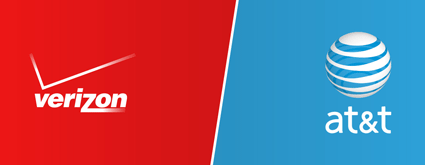With AT&T’s acquisition of Time Warner complete and Disney struggling with Comcast over Fox, how should Verizon’s new CEO approach today’s turbulent media landscape? Center director Jeffrey Cole explains.
______________________________
By Jeffrey Cole
As expected, this week the courts overruled the Justice Department and allowed AT&T to acquire Time Warner. Two days after the ruling, the sale was complete, and we have heard the last of the Time Warner name. Any significance to the Time name ended several years ago when Time Warner spun off the magazine division. With this new change, the Warner label will disappear from the corporate name, and only identify the entertainment division.
 If the courts had rejected the $85 billion acquisition, it likely would have endangered Disney’s (and now Comcast’s) pursuit of Fox’s assets, and it might have stalled or prevented many additional deals down the road.
If the courts had rejected the $85 billion acquisition, it likely would have endangered Disney’s (and now Comcast’s) pursuit of Fox’s assets, and it might have stalled or prevented many additional deals down the road.
Now the floodgates are open.
A new round of musical chairs in the media, entertainment, and technology business is about to begin with a vengeance. The biggest takeover targets are CBS, Viacom (Paramount), Sony Pictures Entertainment (not the electronics part, but who knows), and Lionsgate (the studio without a physical lot). When the large acquirers — Amazon, Facebook, Google (Alphabet) and Apple — get in the game, the prey could even be Netflix or Disney. In two years, the media landscape will be vastly altered with a small number of clear winners.
At the studio level, only Disney, AT&T (Time Warner), and NBC Universal Comcast are sufficiently beefed up to compete in the new world of direct-to-consumer content.
I want to focus on a giant company that has been flying below the radar and has only made relatively small acquisitions. It’s a company that is as big and significant as all the studios and the telcos, and has yet to develop, or at least announce, a media strategy. That company is Verizon.
Over the past few years, Verizon acquired AOL in 2015 for $4.4 billion and then Yahoo (or what was left of it) in 2017 for $4.5 billion. For a company capitalized at $200 billion, these have been minor acquisitions. Even though they have all been combined under a new division called Oath (under Google’s original architect of advertising, Tim Armstrong), compared to what Amazon, Disney, and AT&T are doing, this is the minor leagues.
What will Verizon do as its arch-rival, AT&T, just successfully pulled off one of the biggest media mergers ever by swallowing one of the six studios? With Fox eventually going to Disney or Comcast (or whoever will offer the biggest deal) the six will become five; only two are possible Verizon targets.
_________________________________________________________________________________________________
Verizon should follow Amazon’s strategy rather than that of AT&T. An investment of $5 billion (what they spent for AOL and then again for Yahoo) could get Verizon well on the way to accumulating the creative and production talent that would allow it to compete with and then move ahead of the legacy players.
_________________________________________________________________________________________________
Not only does Verizon face competitive forces, it now has something to prove. Whenever Americans talk about telcos, it is always AT&T and Verizon as the equals among the big two.
AT&T has just pulled far ahead of Verizon in vision and reach.
Now Verizon’s big rival has some of the best content assets in the world: HBO, Warner Bros., and Turner (which includes CNN). Add to the new purchase AT&T’s acquisition of DirecTV in 2014 for $50 billion, and Verizon looks emaciated as simply a telco with a few internet assets.
Telcos around the world had made massive amounts of money for generations by charging customers for phone calls. As recently as ten years ago, callers could rack up huge fees for calling within their own metropolitan area.
Today, long distance charges have been eliminated to zero, and even international costs have been massively reduced through special calling plans and Skype and WhatsApp. The lost voice revenue has been replaced by data charges. The average customer pays $30 or more a month for data charges, and some, roaming while overseas, have racked up of bills of thousands of dollars. Now, data is being commoditized, and roaming charges are disappearing (slower than they should).
The phone business is not growing. Telcos need content to attract and retain their customers.
In the U.S., AT&T is allied with (and now owns) HBO. Sprint has a relationship with Hulu, and T-Mobile has one with Netflix. Verizon stands alone.
Verizon has the money, and the courts have cleared the path, so expect it to be studying the media landscape for a major acquisition. Verizon is also about to get a new CEO to lead the efforts. On August 1, Verizon’s CTO Hans Vestberg will succeed longtime CEO Lowell McAdam, who is retiring. Vestberg is best known for having been the CEO of Ericsson.
Vestberg is exactly the right choice for Verizon at this critical juncture for the company. Unlike most CEOs of telcos who came through the ranks as “pole climbers” or engineers, his background and degree are in business. At Ericsson he was CFO before becoming CEO. He created a strong worldwide vision for “the networked society,” predicting that “everything that can benefit from a connection will get a connection.” While thought to be overly optimistic when he predicted 50 billion connected devices by 2020, Vestberg was right on target.
Vestberg’s selection to run Verizon (over fellow executives who had been there longer) demonstrates a strong commitment to the core mobile business. Ericsson is the leading architect of 5G— the new mobile service that should allow vast amounts of entertainment to be seamlessly brought to the home and mobile: TV Everywhere.
With their arch-rival AT&T having moved so forcefully into the media space, Verizon and Vestberg will be under heavy pressure to make an enormous move. He should resist that pressure.
_________________________________________________________________________________________________
A new round of musical chairs in the media, entertainment, and technology business is about to begin with a vengeance. The biggest takeover targets are CBS, Viacom (Paramount), Sony Pictures Entertainment (not the electronics part, but who knows), and Lionsgate (the studio without a physical lot). When the large acquirers — Amazon, Facebook, Google (Alphabet) and Apple — get in the game, the prey could even be Netflix or Disney. In two years, the media landscape will be vastly altered with a small number of clear winners.
_________________________________________________________________________________________________
If the Disney-Comcast war for Fox’s film and television assets becomes heated and prolonged, Verizon could jump in and make an offer. But that is highly unlikely. The remaining studios, Paramount and Sony, are too small, need too much fixing, and would not add significantly to Verizon’s portfolio.
`
In my last column, I detailed why Amazon decided to build a studio rather than simply buy one. Their capitalization is four times that of AT&T and they could have bought any of the studios including Disney or Time Warner or even Netflix. Amazon realized it was far less expensive to build their own entertainment center.
Verizon should follow Amazon’s strategy rather than that of AT&T. An investment of $5 billion (what they spent for AOL and then again for Yahoo) could get Verizon well on the way to accumulating the creative and production talent that would allow it to compete with and then move ahead of the legacy players.
Rarely has an executive had such a level playing field to move his company into the next 20 years. The new CEO understands that the core mobile business has become commoditized and is looking at modest growth. The courts have made it clear they will do little in the near future to block major moves. Verizon sits on a massive chest of cash.
Verizon should resist the temptation to make a splashy Hollywood move. Vestberg is unlikely to be attracted by the lure of spending time with glamorous stars at Hollywood parties. In this new environment, his corporate dollars are worth more than they have ever been. He should build and consolidate instead of going on a shopping spree.
____________

Jeffrey Cole is the founder and director of The Center for the Digital Future at USC Annenberg.
See all columns from the Center.
June 18, 2018

